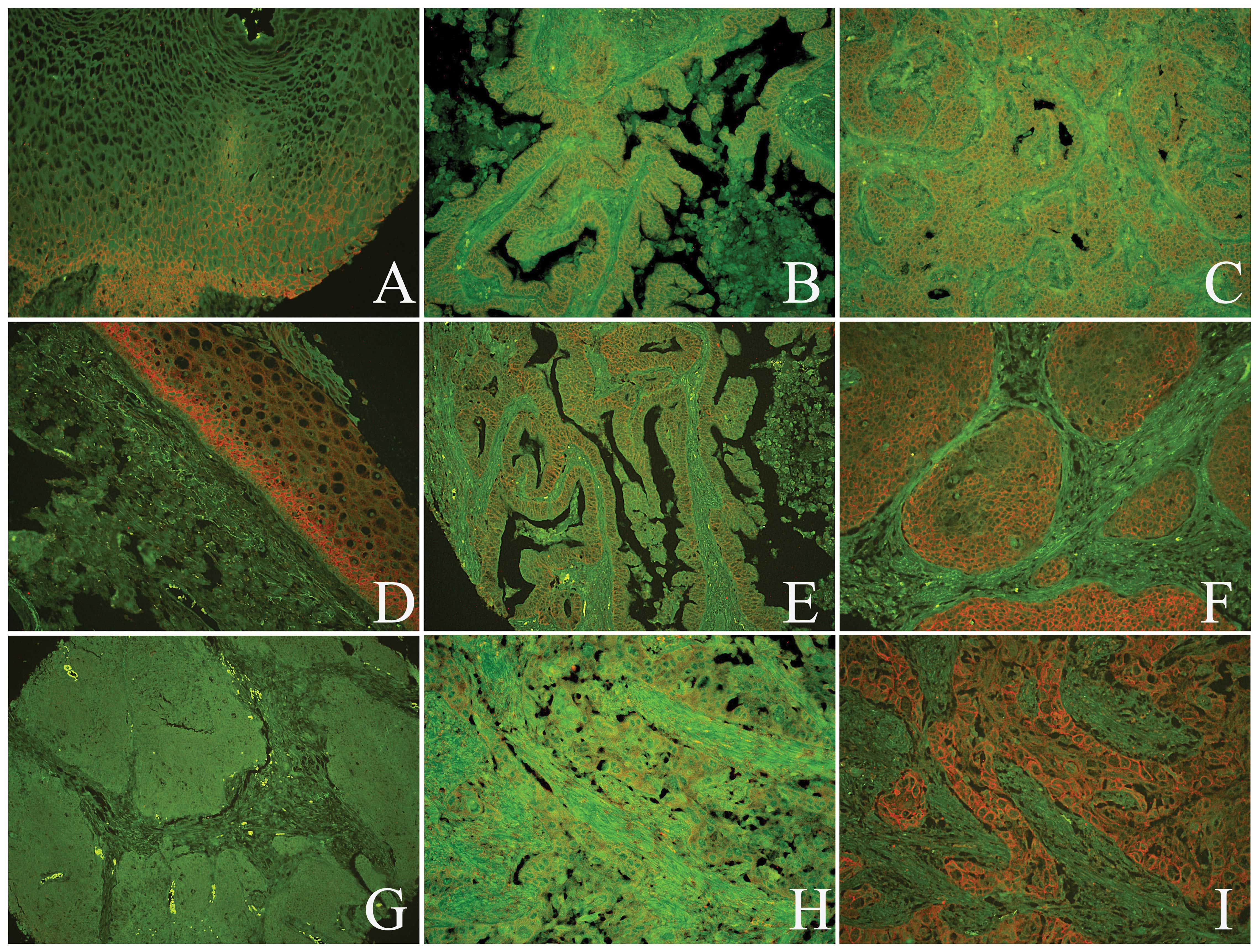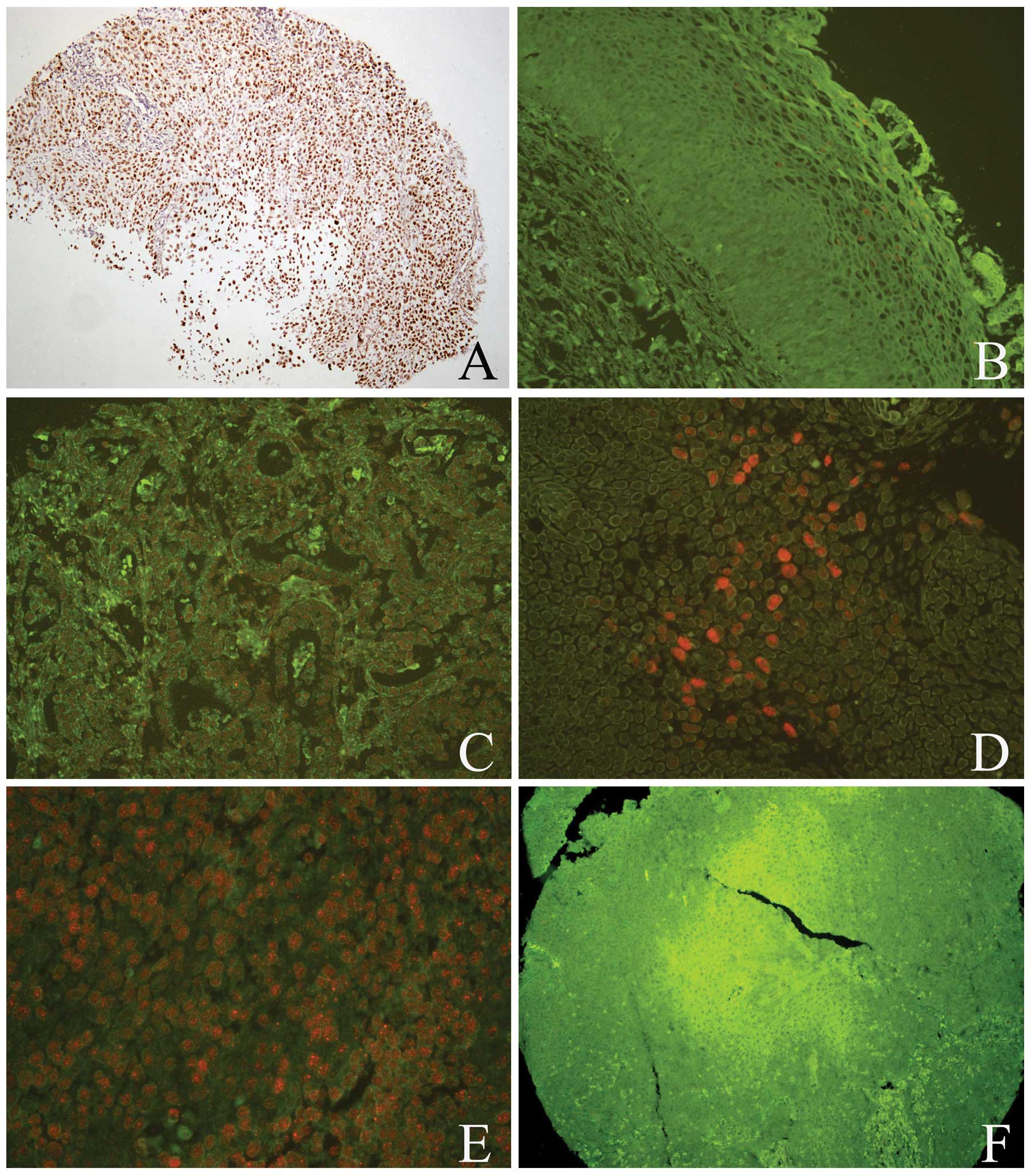|
1
|
Pandey S, Mishra M and Chandrawati: Human
papillomavirus screening in north Indian women. Asian Pac J Cancer
Prev. 13:2643–2646. 2012.
|
|
2
|
Walboomers JM, Jacobs MV, Manos MM, et al:
Human papillomavirus is a necessary cause of invasive cervical
cancer worldwide. J Pathol. 189:12–19. 1999.
|
|
3
|
Li J, Kang LN and Qiao YL: Review of the
cervical cancer disease burden in mainland China. Asian Pac J
Cancer Prev. 12:1149–1153. 2011.
|
|
4
|
Muñoz N: Human papillomavirus and cancer:
the epidemiological evidence. J Clin Virol. 19:1–5. 2000.
|
|
5
|
zur Hausen H: Papillomaviruses and cancer:
from basic studies to clinical application. Nat Rev Cancer.
2:342–350. 2002.
|
|
6
|
Nakatogawa H, Suzuki K, Kamada Y and
Ohsumi Y: Dynamics and diversity in autophagy mechanisms: lessons
from yeast. Nat Rev Mol Cell Biol. 10:458–467. 2009.
|
|
7
|
Liu JJ, Lin M, Yu JY, Liu B and Bao JK:
Targeting apoptotic and autophagic pathways for cancer
therapeutics. Cancer Lett. 300:105–114. 2011.
|
|
8
|
Janku F, McConkey DJ, Hong DS and Kurzrock
R: Autophagy as a target for anticancer therapy. Nat Rev Clin
Oncol. 8:528–539. 2011.
|
|
9
|
Mathew R and White E: Autophagy in
tumorigenesis and energy metabolism: friend by day, foe by night.
Curr Opin Genet Dev. 21:113–119. 2011.
|
|
10
|
Mizushima N: The pleiotropic role of
autophagy: from protein metabolism to bactericide. Cell Death
Differ. 12(Suppl 2): S1535–S1541. 2005.
|
|
11
|
Chen HL, Peng J, Zhu XB, et al: Detection
of EBV in nasopharyngeal carcinoma by quantum dot fluorescent in
situ hybridization. Exp Mol Pathol. 89:367–371. 2010.
|
|
12
|
Eskelinen EL and Saftig P: Autophagy: a
lysosomal degradation pathway with a central role in health and
disease. Biochim Biophys Acta. 1793:664–673. 2009.
|
|
13
|
Miracco C, Cevenini G, Franchi A, et al:
Beclin 1 and LC3 autophagic gene expression in cutaneous
melanocytic lesions. Hum Pathol. 41:503–512. 2010.
|
|
14
|
Zhang YH, Wu YL, Tashiro S, Onodera S and
Ikejima T: Reactive oxygen species contribute to oridonin-induced
apoptosis and autophagy in human cervical carcinoma HeLa cells.
Acta Pharmacol Sin. 32:1266–1275. 2011.
|
|
15
|
Wang ZH, Xu L, Wang Y, Cao MQ, Li L and
Bai T: Clinicopathologic correlations between human papillomavirus
16 infection and Beclin 1 expression in human cervical cancer. Int
J Gynecol Pathol. 30:400–406. 2011.
|
|
16
|
Pecorelli S: Revised FIGO staging for
carcinoma of the vulva, cervix, and endometrium. Int J Gynaecol
Obstet. 105:103–104. 2009.
|
|
17
|
Li M, Chen H, Diao L, Zhang Y, Xia C and
Yang F: Caveolin-1 and VEGF-C promote lymph node metastasis in the
absence of intratumoral lymphangiogenesis in non-small cell lung
cancer. Tumori. 96:734–743. 2010.
|
|
18
|
Chen H, Xue J, Zhang Y, Zhu X, Gao J and
Yu B: Comparison of quantum dots immunofluorescence histochemistry
and conventional immunohistochemistry for the detection of
caveolin-1 and PCNA in the lung cancer tissue microarray. J Mol
Histol. 40:261–268. 2009.
|
|
19
|
He Y, Zhao X, Gao J, et al: Quantum
dots-based immunofluorescent imaging of stromal fibroblasts
caveolin-1 and light chain 3B expression and identification of
their clinical significance in human gastric cancer. Int J Mol Sci.
13:13764–13780. 2012.
|
|
20
|
Li ZH, Peng J and Chen HL: Bioconjugated
quantum dots as fluorescent probes for biomedical imaging. J
Nanosci Nanotechnol. 11:7521–7536. 2011.
|
|
21
|
Karpathiou G, Sivridis E, Koukourakis MI,
et al: Light-chain 3A autophagic activity and prognostic
significance in non-small cell lung carcinomas. Chest. 140:127–134.
2011.
|
|
22
|
Sivridis E, Koukourakis MI, Zois CE, et
al: LC3A-positive light microscopy detected patterns of autophagy
and prognosis in operable breast carcinomas. Am J Pathol.
176:2477–2489. 2010.
|
|
23
|
Yoshioka A, Miyata H, Doki Y, et al: LC3,
an autophagosome marker, is highly expressed in gastrointestinal
cancers. Int J Oncol. 33:461–468. 2008.
|
|
24
|
Liang XH, Jackson S, Seaman M, et al:
Induction of autophagy and inhibition of tumorigenesis by beclin 1.
Nature. 402:672–676. 1999.
|
|
25
|
Jiang ZF, Shao LJ, Wang WM, Yan XB and Liu
RY: Decreased expression of Beclin-1 and LC3 in human lung cancer.
Mol Biol Rep. 39:259–267. 2012.
|
|
26
|
Nicotra G, Mercalli F, Peracchio C, et al:
Autophagy-active beclin-1 correlates with favourable clinical
outcome in non-Hodgkin lymphomas. Mod Pathol. 23:937–950. 2010.
|
|
27
|
Geng QR, Xu DZ, He LJ, et al: Beclin-1
expression is a significant predictor of survival in patients with
lymph node-positive gastric cancer. PLoS One. 7:e459682012.
|
|
28
|
Zhu W, Pan X, Li F, Zhang Y and Lu X:
Expression of Beclin 1 and LC3 in FIGO stage I–II cervical squamous
cell carcinoma and relationship to survival. Tumour Biol.
33:1653–1659. 2012.
|
|
29
|
Fujii S, Mitsunaga S, Yamazaki M, et al:
Autophagy is activated in pancreatic cancer cells and correlates
with poor patient outcome. Cancer Sci. 99:1813–1819. 2008.
|
|
30
|
Deretic V and Levine B: Autophagy,
immunity, and microbial adaptations. Cell Host Microbe. 5:527–549.
2009.
|
|
31
|
Jordan TX and Randall G: Manipulation or
capitulation: virus interactions with autophagy. Microbes Infect.
14:126–139. 2012.
|
|
32
|
Griffin LM, Cicchini L and Pyeon D: Human
papillomavirus infection is inhibited by host autophagy in primary
human keratinocytes. Virology. 437:12–19. 2013.
|
|
33
|
Ishii Y: Electron microscopic
visualization of autophagosomes induced by infection of human
papillomavirus pseudovirions. Biochem Biophys Res Commun.
433:385–389. 2013.
|
|
34
|
Spangle JM and Münger K: The human
papillomavirus type 16 E6 oncoprotein activates mTORC1 signaling
and increases protein synthesis. J Virol. 84:9398–9407. 2010.
|
|
35
|
Clarke MA, Wentzensen N, Mirabello L, et
al: Human papillomavirus DNA methylation as a potential biomarker
for cervical cancer. Cancer Epidemiol Biomarkers Prev.
21:2125–2137. 2012.
|
|
36
|
Surviladze Z, Sterk RT, DeHaro SA and
Ozbun MA: Cellular entry of human papillomavirus type 16 involves
activation of the phosphatidylinositol 3-kinase/Akt/mTOR pathway
and inhibition of autophagy. J Virol. 87:2508–2517. 2013.
|
|
37
|
Chen TC, Hung YC, Lin TY, et al: Human
papillomavirus infection and expression of ATPase family AAA domain
containing 3A, a novel anti-autophagy factor, in uterine cervical
cancer. Int J Mol Med. 28:689–696. 2011.
|
|
38
|
Feng W, Duan X, Liu J, Xiao J and Brown
RE: Morphoproteomic evidence of constitutively activated and
overexpressed mTOR pathway in cervical squamous carcinoma and high
grade squamous intraepithelial lesions. Int J Clin Exp Pathol.
2:249–260. 2009.
|
















